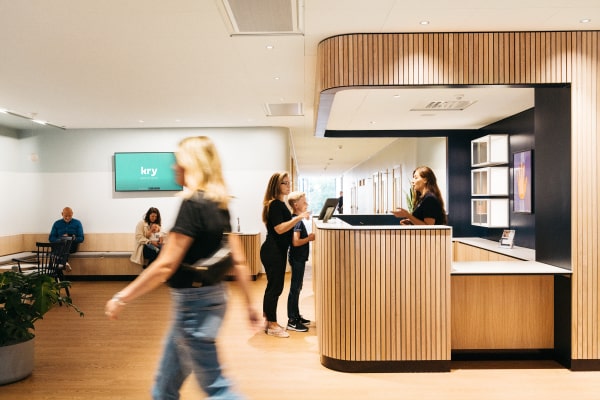Kry is a Swedish digital health startup, which offers telehealth service and software tools to connect clinicians with patients for remote consultations. It had managed to raise a €140M Series C just before the pandemic hit in Western Europe, in January 2020.
On 27 April 2021, it announced an oversubscribed sequel. The Series D raise clocked in at €262M and will be used to keep the growth up in the region.
Investors in this latest round for the 2015-founded startup are a mix of old and new backers. The Series D is led by CPP Investments (aka, the Canadian Pension Plan Investment Board) and Fidelity Management & Research LLC, with participation from existing investors including The Ontario Teachers’ Pension Plan, as well as European-based VC firms Index Ventures, Accel, Creandum and Project A.
Pandemic behind the fast digital healthcare boom?
With the need for social distancing during the pandemic, the popularity and acceptance of digital health tools that enable remote consultations by both patients and clinicians have surged. Kry quickly stepped in to offer a free service for doctors to conduct web-based consultations last year, saying at the time that it felt a huge responsibility to help.
That agility in a time of public health crisis has clearly paid off. Kry’s year-over-year growth in 2020 was 100% — meaning that the ~1.6M digital doctors’ appointments it had served up a year ago now exceed 3M. Some 6,000 clinicians are also now using its telehealth platform and software tools.
Yet co-founder and CEO, Johannes Schildt, says that, in some ways, it’s been a rather quiet 12 months for healthcare demand.
Schildt says, “Obviously we have been on the right side of a global pandemic. And if you look back the megatrend was obviously there long before the pandemic but the pandemic has accelerated the trend and it has served us and the industry well in terms of anchoring what we do”. One thing that is now clear to the world is that telemedicine and digital healthcare is a crucial part of the healthcare systems moving forward.
Telemedicine is the new way for Kry
The free version of Kry’s tools for clinicians generated “big uplift” for the business, per Schildt, but he’s more excited about the wider service delivery shifts that are happening as the pandemic has accelerated uptake of digital health tools.
“For me the biggest thing has been that the telemedicine is now very well established, it’s well anchored… There is still a different level of maturity between different European markets. Even at the start of 2020, telemedicine was maybe not something that was a given, but for Kry, for me, it’s always been crystal clear that this is the way of the future; it’s a necessity, you need to shift a lot of the healthcare delivery to digital. We just need to get there.”
Schildt argues that in order to widen access to limited healthcare resources vs ever-growing demand, the shift to digital is a necessary one. This is why Kry’s focus has always been on solving inefficiencies in healthcare delivery.

How Kry strives to solve inefficiencies in healthcare delivery?
It seeks solve the inefficiencies by offering support tools for clinicians working in public healthcare systems; as well as running a full healthcare service in a few markets, itself where it combines telemedicine with a network of physical clinics where users can go when they need to be examined in person by a clinician. It also has partnerships with private healthcare providers in Europe.
In short, Kry is agnostic about how it helps deliver healthcare.
Kry’s product roadmap is getting an investment boost with this new funding. It involves expanding its patient-facing app to offer more digitally delivered treatments, such as Internet Cognitive Based Therapy (ICBT) and mental health self-assessment tools. It also plans to invest in digital healthcare tools to support chronic healthcare conditions — whether by developing more digital treatments itself or expanding its capabilities via acquisitions and strategic partnerships, according to Schildt.
Digital health from the patients perspective
Schildt says, “A lot of what we do we do is through video and text but that’s just one part of it. Now we’re investing a lot in our mental health plans and doing ICBT treatment plans. We’re going deeper into chronic treatments. We have great tools for clinicians to deliver high quality care at scale. Both digitally and physically because our platform supports both of it. And we have put a lot of effort during this year to link together our digital healthcare delivery with our physical healthcare delivery that we sometimes run ourselves and we sometimes do in partnerships. So the video itself is just one piece of the puzzle. And for us it’s always been about making sure we saw this from the end consumer’s perspective, from the patient’s perspective.”
Many startups in the digital healthcare space talk the big talk about ‘democratising’ access to healthcare with the help of AI-fuelled triage or even diagnosis chatbots. Whereas Kry doesn’t offer a diagnosis chatbot. The reason for its different emphasis comes back to the choice of problem to focus on – Inefficiencies in healthcare delivery. and the decisions doctors take for the patients is not one of those.
Schildt says that the chatbot system is something that they can build and incorporate effortlessly but in their honest opinoion they don’t find it very useful for the patient.
“In many cases, especially in primary care, you have two categories. You have patients that already know why they need help and then there are those patients who are worried about their symptoms and they are not really sure what it is and need comfort. And I think we’re not there yet where a chatbot would give you that sort of comfort, if this is something severe or not. You still want to talk to a human being” per Schildt.
The common inefficiencies
On the decision side of it, Kry is making sure that the clinicians are making better decisions by doing decision support for them. But they say that decision-making process is not the inefficiency. The matching side is an inefficiency side.
Schildt gives the example of how much the Swedish healthcare system spends on translators (circa €200M) as a “huge inefficiency” that could be reduced simply by smarter matching of multilingual clinicians to patients. “With all technology, it’s always about how do we use technology to solve a real problem, it’s less about the technology itself,” he adds.
Another ‘inefficiency’ that can affect healthcare provision in Europe relates to a problematic incentive to try to shrink costs by making it harder for patients to access primary medical care, whether through complicated claims processes or by offering a bare minimum of information and support to access services, making patients do the legwork of tracking down a relevant professional for their particular complaint and obtaining a coveted slot to see them.
“We want to make it very, very simple for the patients — that they should be able to reach out to us and we will direct you to the right level of care.”
With so much still to do tackling the challenges of healthcare delivery in Europe, Kry isn’t in a hurry to expand its services geographically. Its main markets are Sweden, Norway, France, Germany, and the UK, where it operates a healthcare service itself (not necessarily nationwide), though it notes that it offers a video consultation service to 30 regional markets. “Right now we are very European focused,” says Schildt



